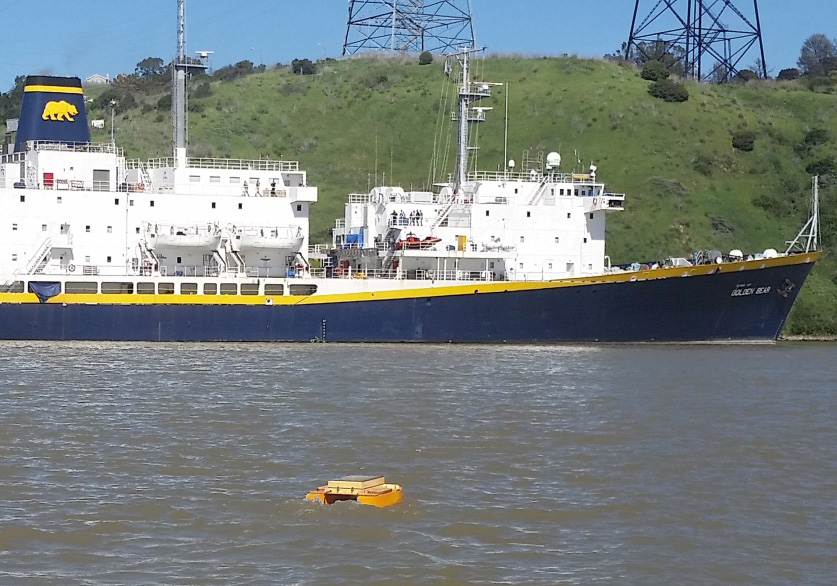News Release

Mike Holden
|
Subscribe
|
Contact: Lynn Cullivan, 415-561-7006
Free Talks On History, Literature, And Conservation Of The Sea:
2018 Blue Room Lecture Series Begins On March 17
Hosted by San Francisco Maritime National Historical Park in
Partnership with the California State University Maritime Academy
The National Park Service and the California State University Maritime Academy are excited to partner on a second annual series of free “Blue Room Lectures” in 2018, presented by academics and independent historians. Mark your calendars and join us in the “Blue Room,” at the east end of the Maritime Museum (900 Beach Street), located within San Francisco Maritime National Historical Park.
March 17 at 1 PM - “Does the Whale’s Magnitude Diminish?” Maritime Labor and the Environment in Melville’s Moby-Dick
For nineteenth-century whalers, the resources of the sea seemed infinite and impossible to deplete. Amy Parsons will discuss how Moby-Dick frames the environmental and human cost of the industry’s tremendous riches during “the golden age of whaling.”
Amy Parsons is an Associate Professor in the Department of Culture and Communication at California State University, Maritime. Her primary areas of research and teaching are the interactions between transnational capital, maritime labor, race and sexuality in nineteenth-century sea fiction.
May 19 at 1 PM - The “Primary Seat of Derangement,” Tracing a Line from the Brain, to the Stomach, to the Sea
Ian Copestake will focus his talk on historical medical research in the 19th century that investigated links between mental illness, severe digestive complaints and the curative effects of the sea voyage. He looks in particular at the consequences of research on this topic by Dr. John Ware on the life and work of one patient of his, Ralph Waldo Emerson.
Dr. Ian Copestake is editor of the “William Carlos Williams Review” and President of the William Carlos Williams Society. He is an independent scholar based in Frankfurt am Main.
July 21 at 1 PM - Whaler, Traitor, Coward, Spy: William Rotch, the Quaker Ethic, and the Spirit of Capitalism
William Rotch had the unusual distinction of being accused of treason four times by three governments in two decades. Sarah Crabtree’s talk re-examines these explosive charges, asking whether his accusers were more upset about his troublesome religion or his thriving business. Rotch’s opposition to war led him to explore new whaling grounds and fishy business practices, making him one of the wealthiest and most hated men in America.
Sarah Crabtree is an Associate Professor of History at San Francisco State University. She is the author of Holy Nation: The Quaker Transatlantic Ministry in an Age of Revolution as well as several articles on transatlantic travel in the Age of Sail. She is currently at work on a graphic history of William Rotch.
September 15 at 1 PM - Autonomous Vessels at Cal Maritime
Mike Holden’s talk will focus on the robotic boats used by students at Cal Maritime and their applications in education and oceanographic measurements.
Michael Holden is a professor of Mechanical Engineering at the California State University Maritime Academy. With a background in aerospace engineering, he worked in the drone aircraft industry before starting his teaching career. He works with his students to design, build, and operate simple autonomous boats for engineering and oceanographic research.
November 10 at 1 PM - Mariners and the Eastern Pacific: The Cycle of Seafaring from Sail to Steam
Jennifer Metz will explore sailing experiences from the mid-19th century to the mid-20th century, such as the process of signing on, work and leisure aboard ship, and activities while in port. Her talk will also evaluate to what extent race, class, and other demographic factors shaped ship-side work and shoreside sailor interactions.
Jennifer Metz is a lecturer of American History, Maritime History, and Politics in the department of Global Studies and Maritime Affairs at California State University, Maritime. She is a recent fellow of the National Endowment for the Humanities Munson Institute of Maritime Studies at Mystic Seaport, Connecticut. Some of her professional projects include developing new history content and pedagogy for the K-12 level, writing for K-12 textbook curriculum, and contributing to public history projects in Bay Area maritime history.
Located at the west end of Fisherman’s Wharf, San Francisco Maritime National Historical Park includes a fleet of historic ships, Visitor Center, Maritime Museum, Maritime Research Center, and the Aquatic Park Historic District. For more information, please call 415-447-5000 or visit nps.gov/safr, Twitter @SFMaritimeNPS, and Facebook @SanFranciscoMaritimeNHP. The Park offers assisted listening services on request. Sign Language interpreter services need to be requested at least five days in advance. Contact Accessibility Coordinator/Chief of Interpretation for more information at 415-859-6797, or e-mail us.
Last updated: February 12, 2018
